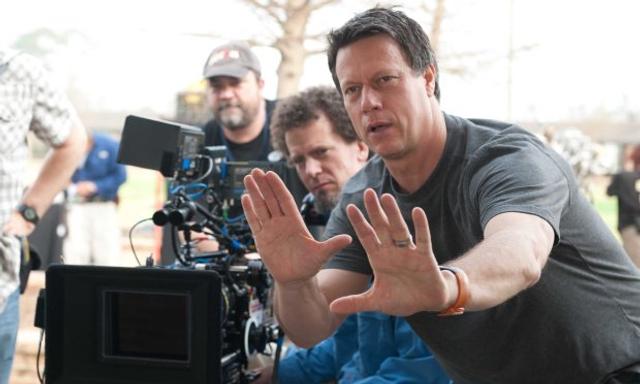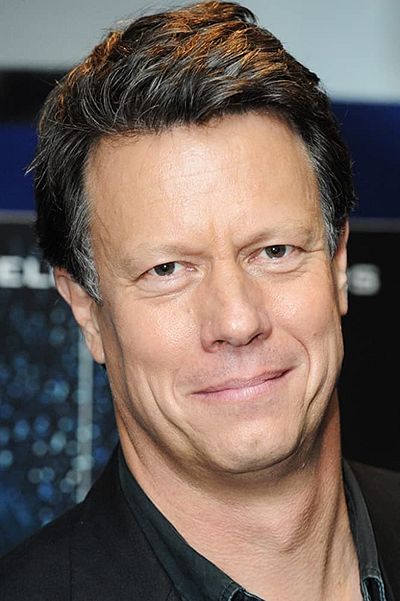Despite the somewhat middling success of Ender's Game and X-Men Origins: Wolverine, Gavin Hood has managed to keep his head down and continue directing.
Eye In The Sky, a prescient military thriller about the legal implications of a drone strike in Africa, sees Hood back in familiar territory and working with familiar themes. As well as being a director, Hood is a former lawyer and was drafted into the South African military when he was 17 - all themes raised in the film and something he himself has experienced.
Set across four distinct areas, a military bunker, a briefing room in Westminister, a drone pilot's container in Las Vegas and the site of the drone strike itself, the film plays out like a courtroom drama and a pressure-cooker thriller in the space of 100 minutes. We began by asking Gavin about working in such different environments with such different pacing.
One of the things I loved about Eye In The Sky is that each location is very specific and very much a part of each actor's performance. How do you work it on set with such vastly different sets and environments?
Production design's a real help. Helen Mirren walked out of the bunker on Day 3 of shooting and she said, "I don't know how people actually really do this job in every day in a bunker like that, it's really unsettling." Actors, y'know, their job is to use their imagination and absorb what's around. Having sets that give them the feeling of the real place. For Aaron Paul, that Ground Control Station is exactly the kind of container they use and we had him in that spot for twelve hours, just like a drone pilot. We had a drone pilot with us as an advisor and piloting drone cameras who worked with Aaron and Phoebe (Fox) to understand what lever they pull, what button they press and so on. To credit Aaron and Phoebe, we weren't using any of that footage. The way we worked was quite tricky, because we had big green screens up with crosses on them to tell them where to look, so when I was with Helen, we didn't have the money to keep all the actors together so I had to feed Helen the lines and the crosses would tell her where to look.
The character that she plays is a real tough nut. Was there any specific performance that made you think she could do this?
I've watched her in so many films that I have a sense of her strength of personality and her intelligence. It's not that I'd seen her in a particular performance, I felt her as a person - because every actor brings their inherent quality to the screen - so I look for that inherent quality in an actor. That role was originally written for a man and as I was reading the script, I kept thinking of Helen Mirren. I've got twins now, a boy and a girl, and I'm very cognisant of gender and these questions. I also felt I didn't want to make a boy's own war movie. I thought the ethical and moral questions that the script raises so beautifully should be talked about by men and women. Casting a woman in that role I felt would bring balance to the film, so that's it not about gender, it's about what would a human being do in this situation.
Were there any other changes you made to the script outside of changing genders?
Guy Hibbert started eight years ago, I came in about three years ago and Guy had already done a huge amount of research. I spent about three months of research and tweaked a few bits here and there, posing questions to Guy about the script. I happen to be a lawyer by background and how I could deliver some of the legal arguments that would still be correct from a lawyer's point of view, but accessible to a lay audience. It's a fine line. When you hear about the question of proportionality in the film, that's the exact terminology that's used. When I pitched the idea of Helen Mirren taking on the role, he only took ten seconds to consider when I explained the same reasons to you. I hasten to say that this is Guy's script. As a director, you come in and make tweaks in terms of pace and editing. I was very afraid of making a sort of static TV movie because they're all in rooms. It was all a question of, how can we make a well-paced thriller with a great deal to talk about? If I made a 5-10% contribution, this is his story and his structure. I just brought a director's perspective.
On that perspective, the editing of the film really ties the whole thing together. Trying to line it all up, with such disparate actors, it must have been difficult.
First off, thanks for bringing up the editor. A lot of people don't. I've a brilliant editor, Megan Gill, who I've worked with for many years and there's a male-female interaction, we both bring different sensibilities and that's always a good thing in an editing room. You're right, it was difficult. It required a lot of editing skill; none of the actors were together. I'm feeding Alan's line to Helen, I'm trying to drive it in a certain direction so that it gets the pacing. I'm thinking about how to use the sets to keep it all moving, to move the camera into Helen into her to keep it moving. We had to make it a cinematic experience so that it's not static and boring. You could have shot this a lot quicker, y'know, if they all sat down and just talked. I could plonk a camera down and let them at it. You've got all these pieces of film together and keep them all cohesive.
Why pick this film?
I didn't know it was going to make it until it came under the door from my agent. I kept reading it, I became fascinated by the multiple points of view presented and I wasn't sure who I agreed with, I wanted to know what happened and when I got to the end, I thought, "Wow, I really want to talk to someone about this!" It made me want to know more about drone warfare, if I did a half-way decent job, it'll do the same for the audience. I knew people in the military, I talked to lawyers, human rights lawyers and so on. I've been immersed in this world for the past three years, reading about drones, artificial intelligence, how these tiny little drones are being weaponised, it's fascinating and a little creepy, if I'm honest. I'm not a big fan of stories that are just good versus evil or standard revenge films, protagonist-antagonist. I don't think the real world works like that, it's much more complex and messy.














































































